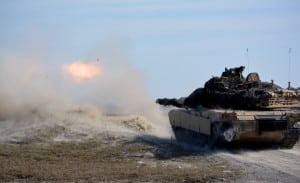A Pentagon spokesperson on Thursday said it “doesn’t make sense” to provide Ukraine with Abrams tanks at this time due to the maintenance and sustainment considerations associated with the platform.
The comments from Deputy Pentagon Press Secretary Sabrina Singh arrive as Germany reportedly won’t offer its Leopard 2 tanks to Ukraine unless the U.S. also commits to sending Abrams tanks as part of future security assistance efforts.

“It’s more of a sustainment issue. [The Abrams] is a tank that requires jet fuel, whereas [with] the Leopard and the [U.K.’s] Challenger [tanks] it’s a different engine. They require diesel. It’s a little bit easier to maintain. They can maneuver across large portions of territory before they need to refuel,” Singh said during a press briefing on Thursday. “The maintenance and the high cost it would take to maintain an Abrams, it just doesn’t make sense to provide that to the Ukrainians at this moment.”
Politico has reported a group of European nations that operate Leopard 2 tanks are looking to press Germany toward allowing them to transfer their platforms to Ukraine.
The ongoing debate over providing Leopard and Abrams tanks precedes the next meeting of the U.S.-led Ukraine Defense Contact Group at Ramstein Air Base in Germany on Friday, where officials from about 50 countries will gather to discuss security assistance efforts to support Kyiv in its fight against Russia’s ongoing invasion.
“I think that [Defense Secretary Lloyd Austin’s] objective here is to secure and work with our partners and allies to get Ukraine the capabilities and [meet] the requests that it has for what it needs on the battlefield. That’s why the [Ukraine Defense] Contact Group is so important,” Singh said.
Singh was asked about the Pentagon’s outlook on whether Germany may change its stance on providing Leopard 2 tanks for Ukraine or giving permission for other European partners to offer their own Leonard tanks.
“Ultimately, this is Germany’s decision. [It’s] their sovereign decision on what security assistance they will provide,” Singh said. “I don’t have a crystal ball here to say what will or won’t happen by the end of the week.”
Ahead of the Ukraine Defense Contact Group meeting, Austin met with new German Defense Minister Boris Pistorius in Berlin on Thursday.
Singh said the two defense leaders had a “productive conversation” and noted Germany’s recent commitments to provide Ukraine with Marder infantry fighting vehicles as well as a Patriot air defense battery (Defense Daily, Jan. 5).
“We are thankful for what Germany has been able to contribute already,” Singh told reporters. “And we are continuing to work with other partners and allies around the world to see what else can be provided to Ukraine. And that’s the whole point of tomorrow’s meeting.”
While Ukraine has reiterated its request for Abrams tanks over the last several weeks, the U.S. has to yet include the platform in a security assistance package with other Pentagon officials also echoing the comments on maintenance and sustainment concerns.
“This is something that we absolutely agree that Ukraine does need tanks. It’s one of the reasons that we partnered with the Netherlands to refurbish a number of T-72 tanks that are already arriving on the battlefield. But we have to be cognizant of maintenance and sustainment considerations with tanks. And, certainly, we know that the Abrams tank, in addition to being a gas guzzler, is quite challenging to maintain. So we want to look across the board at the range of tank capabilities and see where we can all support Ukraine,” Laura Cooper, deputy assistant secretary of defense for Russia, Ukraine and Eurasia, told reporters earlier this month (Defense Daily, Jan. 6).